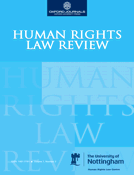Comparative law in the ECHR
Via ECHR blog, news of an important article:
…Article on ECtHR and Comparative Law
Monika Ambrus, a colleague within the Netherlands School of Human Rights Research, based at Erasmus University Rotterdam, has posted ‘Comparative Law Method in the Jurisprudence of the European Court of Human Rights in the Light of the Rule of Law’ on SSRN. The article has appeared in the Erasmus Law Review (vol. 2. No. 3, 2009). This is the abstract:
In several cases, comparative law exercises have been given excessive weight, which has given rise to conflicting interpretations in the case law of the European Court of Human Rights (ECtHR). This use of the comparative law method by the Court has been widely criticised. The critical voices have generally argued in terms of what is prohibited by the principle of the rule of law, which the Court itself is also bound to take into account, namely the arbitrary use of power. In the light of these criticisms, it is a challenging task to examine whether and to what extent the comparative law method complies with the principle of the rule of law, which is the aim of this paper. An analysis of several ECtHR cases demonstrates that in many respects the comparative exercises of the Court indeed do not comply with the requirements set by the formal conception of the rule of law.






